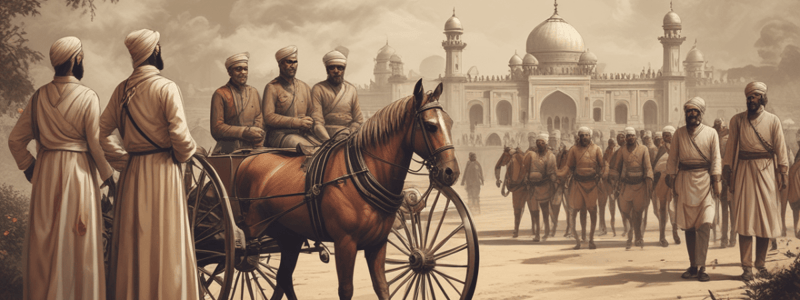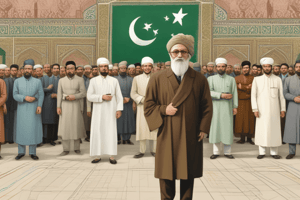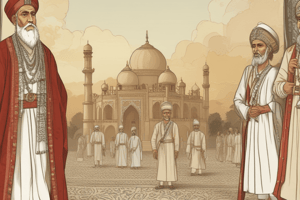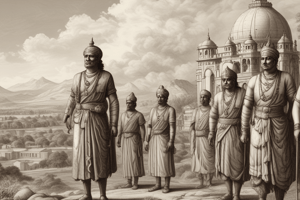Podcast
Questions and Answers
What was the main objective of the Delhi Muslim Proposals in 1927?
What was the main objective of the Delhi Muslim Proposals in 1927?
- To attain separate electorates for Muslims
- To secure statutory Muslim majorities in Punjab and Bengal (correct)
- To boycott the Simon Commission
- To promote Hindu-Muslim unity
What was the reaction of the Muslim League to the Nehru Report?
What was the reaction of the Muslim League to the Nehru Report?
- They were indifferent to the report's recommendations
- They welcomed the report as a step towards Hindu-Muslim unity
- They saw the report as an opportunity to collaborate with the British
- They opposed the report due to its threat to Muslim interests (correct)
What was the outcome of the Delhi Muslim Proposals?
What was the outcome of the Delhi Muslim Proposals?
- The Muslim League was divided into the Shafi League and Jinnah League (correct)
- The Muslim League was united in its support for Jinnah
- The British government accepted all the demands
- The Hindu community rejected the proposals outright
What was the chairmanship of the 10-member committee that drafted the Nehru Report?
What was the chairmanship of the 10-member committee that drafted the Nehru Report?
Why did the Muslim leaders come together to discuss constitutional and political issues?
Why did the Muslim leaders come together to discuss constitutional and political issues?
What was one of the demands made by the Delhi Muslim Proposals?
What was one of the demands made by the Delhi Muslim Proposals?
According to the 14 points presented by Quaid-i-Azam, what was the condition for passing a law?
According to the 14 points presented by Quaid-i-Azam, what was the condition for passing a law?
Why did most political parties boycott the Simon Commission?
Why did most political parties boycott the Simon Commission?
What was the main issue in the Second Roundtable Conference?
What was the main issue in the Second Roundtable Conference?
What was the purpose of the Communal Award announced by Prime Minister Ramsay MacDonald?
What was the purpose of the Communal Award announced by Prime Minister Ramsay MacDonald?
Why did Mahatma Gandhi start a fast unto death?
Why did Mahatma Gandhi start a fast unto death?
Why did Quaid-i-Azam Jinnah not participate in the Third Roundtable Conference?
Why did Quaid-i-Azam Jinnah not participate in the Third Roundtable Conference?
What was the outcome of the conference mentioned in the passage?
What was the outcome of the conference mentioned in the passage?
What was the main purpose of the White Paper issued by the British government in 1933?
What was the main purpose of the White Paper issued by the British government in 1933?
When was the Government of India Act approved?
When was the Government of India Act approved?
What was the result of the efforts to settle the communal problems in India?
What was the result of the efforts to settle the communal problems in India?
What was the main demand of the Muslim community in India?
What was the main demand of the Muslim community in India?
What was the eventual outcome of the Muslim demands for independence?
What was the eventual outcome of the Muslim demands for independence?
What was the impact of the conference and the subsequent efforts on Hindu-Muslim relations?
What was the impact of the conference and the subsequent efforts on Hindu-Muslim relations?
What was the significance of the Government of India Act of 1935?
What was the significance of the Government of India Act of 1935?
Study Notes
Muslim Politics in British India: 1924-1935
Delhi Muslim Proposals (1927)
- Led by Quaid-i-Azam, Muslim leaders met in Delhi to discuss constitutional and political issues
- Demands included:
- Statutory Muslim majorities in Punjab and Bengal
- No weightage in provinces
- Sind to be separated from Bombay
- Constitutional reforms in NWFP
- One-third seats for Muslims in Central Legislature
- No law to be passed if three-fourth members of the concerned community oppose it
- Muslims would give up 'separate electorate' if demands were accepted
Nehru Report (1928)
- Aimed to constitute proposals for the Indian Constitution
- Recommendations threatened Muslim interests, including:
- No separate electorate
- No one-third seats for Muslims in Central Assembly
- No reservation of seats for Muslims in Punjab and Bengal
- Sind to be made a province if it can bear its expenses
- Quaid-i-Azam tried to amend the Report but was unsuccessful, leading him to remark "it is parting of the ways"
Quaid-i-Azam's Fourteen Points (1929)
- Federal system with residuary powers with the provinces
- Provincial autonomy
- Separate electorate for Muslims
- Effective representation to minorities in provinces
- One-third representation of Muslims in Central Legislature
- One-third Muslim representation in cabinets
- No changes in Punjab and Bengal boundaries affecting Muslim majority
- Religious freedom to all
- No law to be passed if three-fourth elected members of a community declare it against their interests
- Sind to be made a separate province
- Constitutional reforms in NWFP and Balochistan
- Muslim representation in government jobs
- Constitutional safeguards for Islamic culture and civilization, education, language, personal laws, and Muslim institutions
Simon Commission (1927-1930)
- Sent by the British government to seek Indian opinion on future constitutional arrangements
- Proposed a federal system of government with a strong centre, two Houses, and abolition of the Dyarchy system in provinces
- Most political parties, including the Congress, boycotted the Commission
Round Table Conferences (1930-1932)
- First session: emphasized federalism, self-government, safeguards for minorities, separate electorate, and preferential representation in the central legislature
- Second session: key issues were 'Federation' and 'Minorities'
- Third session: poorly attended, with no significant progress
Communal Award and Poona Pact (1932)
- Announced by Prime Minister Ramsay MacDonald, the Communal Award included:
- Separate electorate for all minorities of India
- Weightage to minorities
- No Muslim majorities in Punjab and Bengal
- One-third representation for Muslims in the Central Legislature
- One-fourth representation for Muslims in services
- Sind to be made a province
- The Poona Pact: an agreement between the Congress and low-caste Hindus (Harijans) to surrender the right to separate electorate, saving Gandhi's life
Studying That Suits You
Use AI to generate personalized quizzes and flashcards to suit your learning preferences.
Description
Explore the key events and proposals that shaped Muslim politics in British India, including the Delhi Muslim Proposals, Nehru Report, and Quaid-i-Azam's Fourteen Points.




